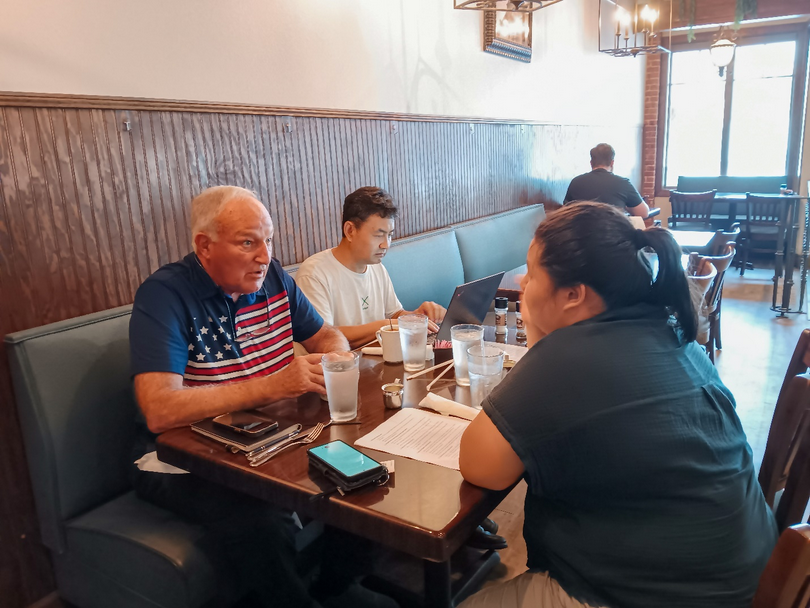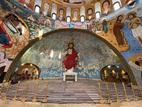Editor's note: Yin Baibin, the founder of Hope Garden Public Welfare in Beijing, has dedicated himself to entrepreneurship and employment education for marginalized individuals struggling with addiction, helping them reintegrate into society. During a recent stay in the United States, he and his daughter, Li Huilin, actively engaged with various missional churches and participated in their inspiring activities. Written by Li Huilin, this article tells the story of Ken Pyle, an American missionary whose faith in action deeply moved Yin and his daughter.
Eight years ago, when Ken Pyle moved to Pensacola, Florida, this sunlit city welcomed a mission-driven practitioner. This American Navy Captain didn't settle into a life of leisure after retirement, but instead, he embarked on a new chapter of his life. He kept the story of the "Good Samaritan" from the Bible close to his heart, believing every homeless person was his neighbor, and demonstrated through his actions what it truly means to "love your neighbor as yourself."
"Whoever you encounter is your neighbor," Pyle often said. "The homeless on the streets are my neighbors. Since they have come into my life, I have a responsibility to do something for them."
From the Battlefield to the Street Corner: The Continuation of the Mission
Pyle's sense of mission stemmed from his long military career. He joined the U.S. Navy in 1968 and served for 26 years, holding command positions in ships and aircraft squadrons, as well as aircraft carrier executive officer. During his service, he commanded thousands of sailors aboard warships, navigating turbulent seas. These experiences shaped his decisive and resilient character. However, his life's direction truly shifted after retiring in 1994, when he began noticing social issues.
"The eyes of the homeless seem to cry out, filled with the pain of being abandoned by society," Pyle recalled. He understood that a single meal or a bed was not enough to change their circumstances. In Fort Smith, Arkansas, where he moved with his wife, he launched the Riverview Hope Campus project, an eight-year effort that raised $4 million to build a fully functional shelter for the homeless. This center provides not only housing and meals but also psychological counseling, job training, a kennel for pets, and a medical clinic on-site.
After moving to Pensacola, he continued his mission with renewed vigor. Pyle recognized that solving homelessness required more than just providing shelter; it demanded awakening the community's collective involvement. He actively collaborated with local organizations to bring dignity and hope to those living on the streets, whom he regarded as his neighbors.
The Definition of Neighbor: From Scripture to Reality
Pyle took the story of the Good Samaritan from the Gospel of Luke as his guiding principle. In the story, the Samaritan stops to help a traveler who had been robbed, breaking through social barriers and demonstrating the true meaning of being a neighbor through his actions. From this, Pyle realized that the definition of a neighbor is not confined by race, status, or geography but is rooted in compassion and responsibility.
"Every person in need is my neighbor," Pyle said. "The homeless are the most common neighbors we encounter on our streets, and our responsibility is to embrace them, not avoid them." He walked the streets and riverside camps of Fort Smith, engaging with the homeless and listening to their stories. His concern went beyond their basic needs; he provided them with dignified living conditions. "The suffering of the homeless is real," he emphasized. "Helping them is a fundamental humanitarian duty."
Pyle's efforts in Fort Smith extended far beyond individual actions. He organized community fundraisers, partnered with local churches, and sought support from private donors, successfully raising funds to build a low-barrier shelter with appropriate facilities to enhance services. He also worked with the mayor and city council, advocating for a reduction in law enforcement interventions against the homeless and instead focusing on providing shelters and resources to help them rebuild their lives. "What we need to do is preserve their remaining dignity, not use force to make them feel rejected," he stressed.
Gracious Assistance: Refusing Unethical Transactions
Pyle firmly opposed turning aid into a transaction. He refused to make religious participation a condition for receiving help, believing that true assistance is built on trust and respect, not coercion.
At the shelter he led, pastors from various denominations were invited to preach each week, but participation was entirely voluntary for the residents. "The Gospel is a force of attraction, not a tool for pressure," he said. "We hope to demonstrate Christ's love through our actions, allowing them to experience it freely, rather than imposing it as a requirement."
The Warmth of "Good Samaritan's Testimony": Starting with Accompaniment
Pyle believed that true assistance went beyond material support—it was about human connection and companionship. He insisted that the shelter serve proper meals instead of cold canned food, and volunteers were required to listen to the residents' needs rather than simply distributing supplies. "Respecting their stories is the first step to helping them regain their dignity," he emphasized.
One man, known as the "Mayor of the Campsite," had spent years living on the streets and harbored deep distrust toward all aid organizations. He had never once considered entering a shelter. Even before the shelter opened, Pyle made consistent and patient efforts to connect with him and listen to his story. Over time, he earned the man's trust. When the shelter finally opened, the "Mayor" agreed to stay for just one night. Experiencing genuine care for the first time, he chose to remain. His decision inspired over 30 others, long-time street dwellers, to follow his lead and move into the shelter.
With the shelter's support, the "Mayor of the Campsite" worked hard to rebuild his life, eventually renting his own apartment and leaving homelessness behind. In the final year of his life, he was able to live with dignity and respect.
This story deeply moved Pyle. "This is the purpose of our work," he said, "to help them rediscover the meaning and dignity of life."
From the Individual to the Community: The Bonds of Love
Pyle understood that addressing homelessness required more than individual efforts. He actively collaborated with churches, nonprofit organizations, and government agencies in Fort Smith to develop long-term solutions for housing and social support for the homeless. Advocating for community cooperation, he envisioned the shelter not only as a haven for residents but also as a hub where churches and the community could come together to tackle societal challenges. In Pensacola, Pyle is working diligently to bring the same dignity and respect to the homeless in this area.
Conclusion: The Call of the Neighbor
Ken Pyle's story is a faithful embodiment of the Good Samaritan spirit. He transformed his faith into action, treating the homeless as neighbors in his life and helping them regain stability with respect and compassion. His efforts not only assisted the homeless but also awakened the community to the importance of addressing social issues.
"We can't change the fate of everyone, but we can do our best for everyone we meet," Pyle said. "As long as there's someone in need, I will keep moving forward."
Pyle's mission is more than a demonstration of care for the homeless—it's a reminder to us all: our neighbors are right beside us. Are we willing to become their Good Samaritans? To respond to the call with love and action is the essence of true faith.
Originally from the Christian Times
CCD reprinted with permission.












